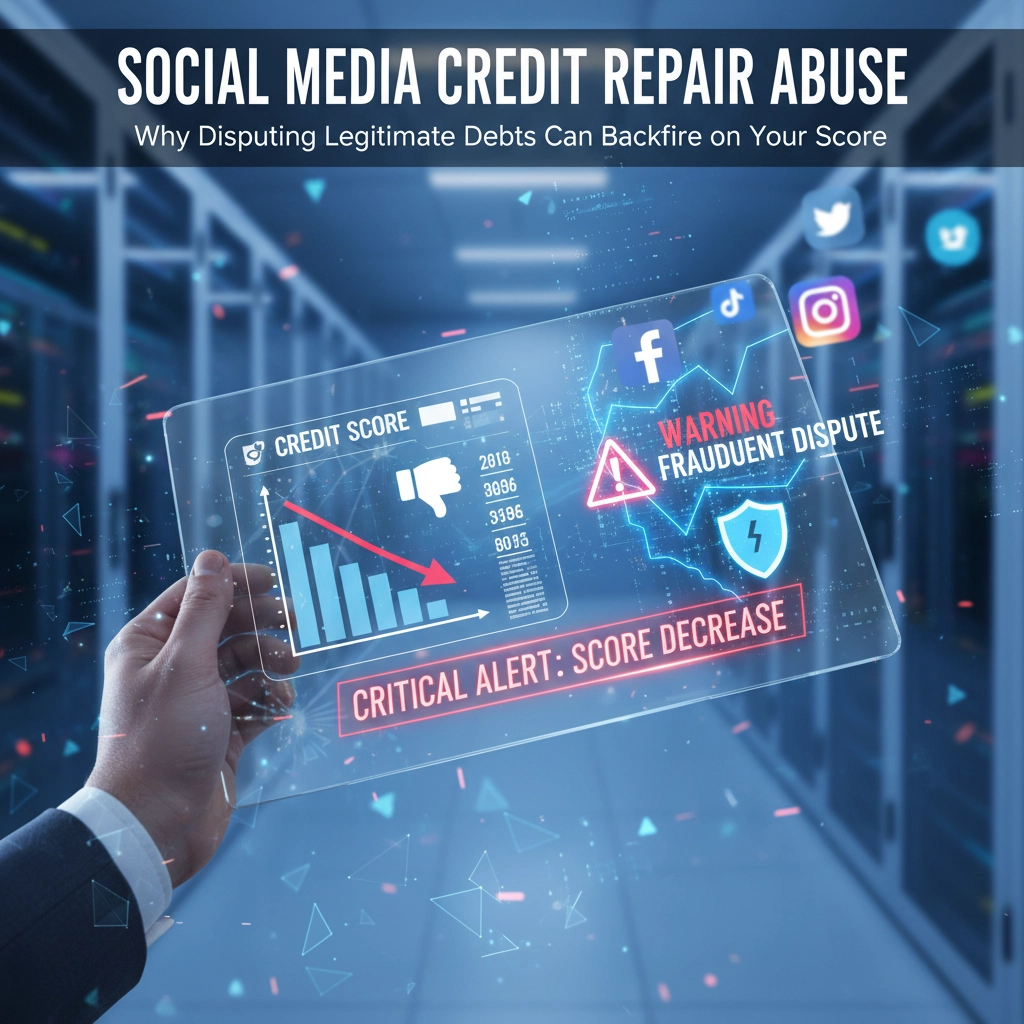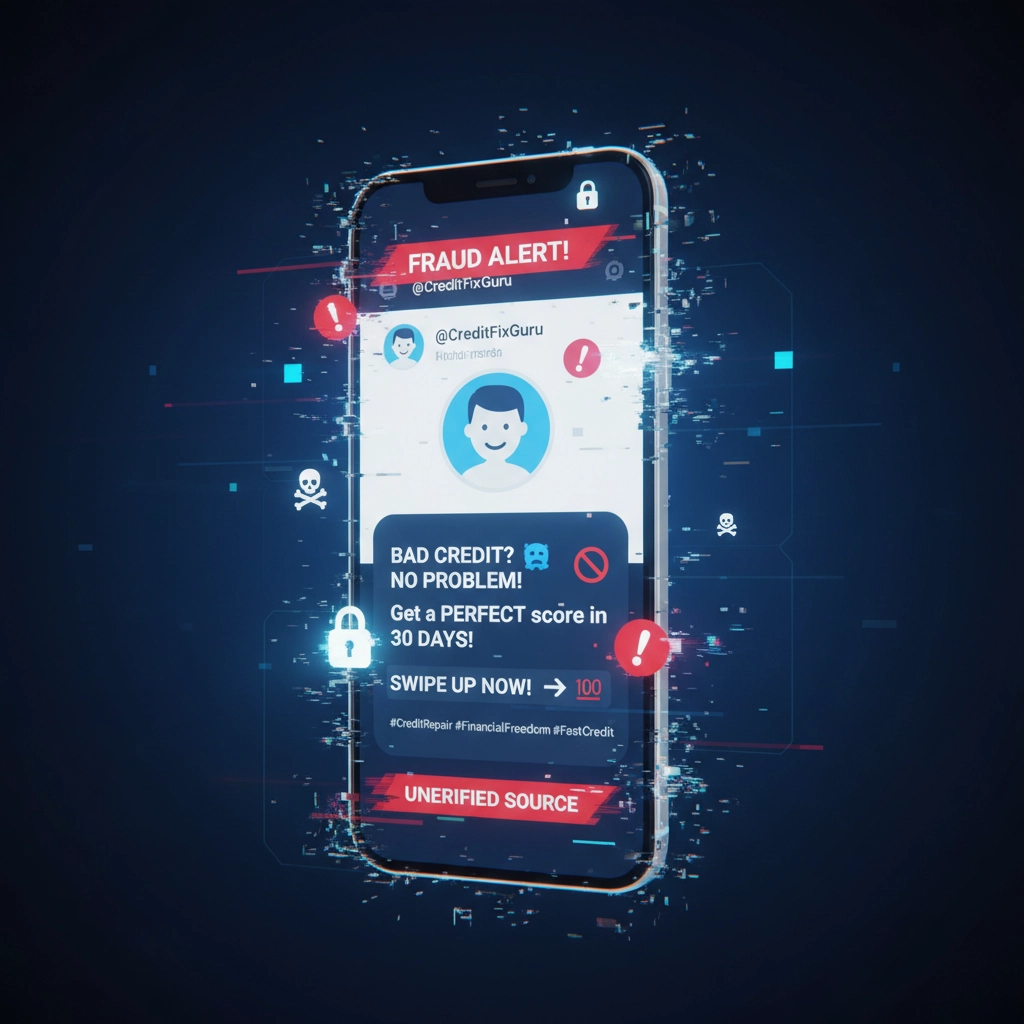Social Media Credit Repair Abuse: Why Disputing Legitimate Debts Can Backfire on Your Score

Have you been scrolling through TikTok or Instagram and stumbled across ads promising to "legally remove ALL negative items from your credit report in 30 days"? Or maybe you've seen posts about secret "609 letters" that supposedly force credit bureaus to delete legitimate debts? If so, you've encountered the dark side of social media credit repair: a growing trend that's putting thousands of consumers at serious risk.
These aren't legitimate credit repair strategies. They're sophisticated scams that can land you in legal hot water while draining your bank account. The worst part? They're specifically targeting people who are already struggling financially and desperately need real help with their credit.
Let's break down what's really happening with these social media credit repair schemes and why disputing legitimate debts can seriously backfire on you.
The New Wave of Credit Repair Scams
Social media has become the perfect breeding ground for credit repair scams, and they're getting more sophisticated every day. AI bots and automated campaigns are flooding platforms like TikTok, Instagram, and Facebook with flashy videos and posts that make outrageous promises about credit repair.

Here's what these scammers are typically promoting:
"Credit Sweeps" – This is the big one. Scammers convince you to file false police reports claiming you're a victim of identity theft, even when no actual fraud has occurred. They then complete fake Federal Trade Commission fraud affidavits, falsely claiming that legitimate debts on your credit report are fraudulent.
Template Letter Schemes – You've probably seen these marketed as "609 letters," "debt validation letters," or "credit dispute letters that work 100% of the time." These templates promise to exploit loopholes in credit reporting laws to force the removal of accurate negative information.
Mass Dispute Campaigns – Some scammers use automated systems to dispute every single negative item on your credit report simultaneously, regardless of whether the information is accurate or not.
The problem? None of these tactics work long-term, and they can cause serious damage to your finances and legal standing.
Why Disputing Legitimate Debts Always Backfires
Here's something important to understand: filing a legitimate dispute with credit bureaus doesn't hurt your credit score. In fact, if you identify genuine errors on your credit report, disputing them is your legal right under the Fair Credit Reporting Act (FCRA). But when you dispute legitimate debts that you actually owe, the outcome is entirely different.
You're Wasting Precious Time
Credit bureau investigations typically take up to 30 days to complete. When you dispute legitimate debts, you're essentially putting your real credit repair efforts on hold while waiting for an outcome you already know: the accurate information will remain on your report after investigation.
Temporary Removal Doesn't Last
Sometimes legitimate negative information gets temporarily removed during the investigation process. This might give you a brief credit score boost, but it's like putting a band-aid on a broken arm. Once the credit bureau verifies the information with your creditors (which they will), everything gets restored to your report, and your score drops back down.
You're Ignoring the Real Problem
While you're busy disputing debts you actually owe, you're not addressing the underlying issues that damaged your credit in the first place. Real credit repair involves creating payment plans, negotiating with creditors, and building positive payment history: not filing false disputes.
The Serious Legal and Financial Risks
The consequences of participating in these social media credit repair schemes go far beyond wasted time and temporary score fluctuations. You could be putting yourself at serious legal and financial risk.

Criminal Charges for False Reports
When you file a false police report claiming identity theft (when no actual fraud occurred), you're committing a crime. The same goes for submitting fake fraud affidavits to federal agencies. These aren't minor infractions: they're serious offenses that can result in criminal charges.
Financial Losses from Scam Companies
The FTC recently sent over $3.5 million in refunds to consumers who were harmed by fraudulent credit repair schemes. Think about that number: that's just from a few cases, and it represents real people who lost their hard-earned money to scammers who promised results they couldn't deliver.
Compliance Issues and Legal Exposure
Legal experts are raising serious concerns about consumers who participate in mass dispute campaigns or file false fraud claims. You could face compliance issues with federal agencies and potentially become liable for making false statements to government entities.
How Legitimate Credit Disputes Actually Work
Let's get one thing straight: legitimate credit disputes are powerful tools when used correctly. The key is understanding when and how to use them properly.
Only Dispute Genuinely Inaccurate Information
You should dispute information on your credit report when it's actually wrong. This includes accounts that don't belong to you, incorrect payment histories, duplicate entries, or outdated information that should have fallen off your report.
Focus on Factual Errors
Legitimate disputes focus on factual inaccuracies, not trying to remove accurate negative information through technicalities or false claims. If you missed a payment, that's accurate information: even if you don't like seeing it on your report.
Document Everything
When you do have legitimate disputes, document everything carefully. Keep copies of all correspondence, maintain detailed records of your communications with credit bureaus and creditors, and follow up appropriately on your disputes.
Your Weekly Credit Report: A Legitimate Tool for Success
Here's some genuinely good news that can help you take control of your credit situation: as of 2025, you can now access free credit reports weekly instead of just annually. This is a game-changer for anyone working on credit repair, and it's completely legitimate.

Why Weekly Reports Matter
With weekly access to your credit reports, you can spot errors and identity theft much faster than before. This means you can dispute genuinely inaccurate information quickly, before it has time to do significant damage to your score.
Early Detection of Identity Theft
Regular monitoring helps you catch identity theft early. If someone opens fraudulent accounts in your name, you'll see them on your report within days instead of months. This early detection can save you thousands of dollars and months of credit repair work.
Track Your Progress
As you work on legitimate credit repair strategies: like paying down balances, making on-time payments, and addressing past-due accounts: weekly reports let you see your progress in real-time. This can be incredibly motivating and help you stay on track.
You can access your free weekly credit reports at annualcreditreport.com, the only federally authorized source for free credit reports.
How to Protect Yourself from Credit Repair Abuse
Taking control of your credit doesn't mean falling for scams. Here's how to protect yourself while working toward genuine credit improvement:
Avoid Upfront Fees
Legitimate credit repair companies cannot legally charge you upfront fees. If someone demands money before providing any services, that's a red flag. The Credit Repair Organizations Act (CROA) specifically prohibits this practice.
Be Skeptical of Guarantees
No one can guarantee specific credit score improvements or promise to remove all negative information from your credit report. Anyone making these promises is likely running a scam.
Do It Yourself When Possible
There's nothing a credit repair company can legally do that you can't do yourself. You have the same rights under the FCRA whether you dispute errors personally or hire a company to do it for you.
Seek Professional Help from Licensed Experts
If you do need help with credit repair, work with licensed professionals who understand compliance requirements and follow legal guidelines. Look for companies that are transparent about their processes and realistic about timelines and outcomes.
Taking Control of Your Credit the Right Way
Real credit repair isn't about finding loopholes or filing false disputes: it's about taking systematic, legitimate steps to improve your credit profile over time. This includes paying bills on time, paying down debt balances, and addressing any genuine errors on your credit reports through proper channels.
Remember, your credit score is a reflection of your credit history and current financial behavior. While it takes time to rebuild damaged credit, the improvements you make through legitimate means will be lasting and real.
Don't let social media scammers take advantage of your desire to improve your financial situation. You have more power than you realize to take control of your credit: you just need to use the right strategies and avoid the dangerous shortcuts that promise quick fixes but deliver serious consequences.
Your financial future is worth more than a get-rich-quick scheme disguised as credit repair. Take the legitimate path, use the tools available to you (like those weekly free credit reports), and build credit improvements that will last a lifetime.
#CreditRepair #CreditDispute #Compliance #FixMyCredit #CreditUpdate
